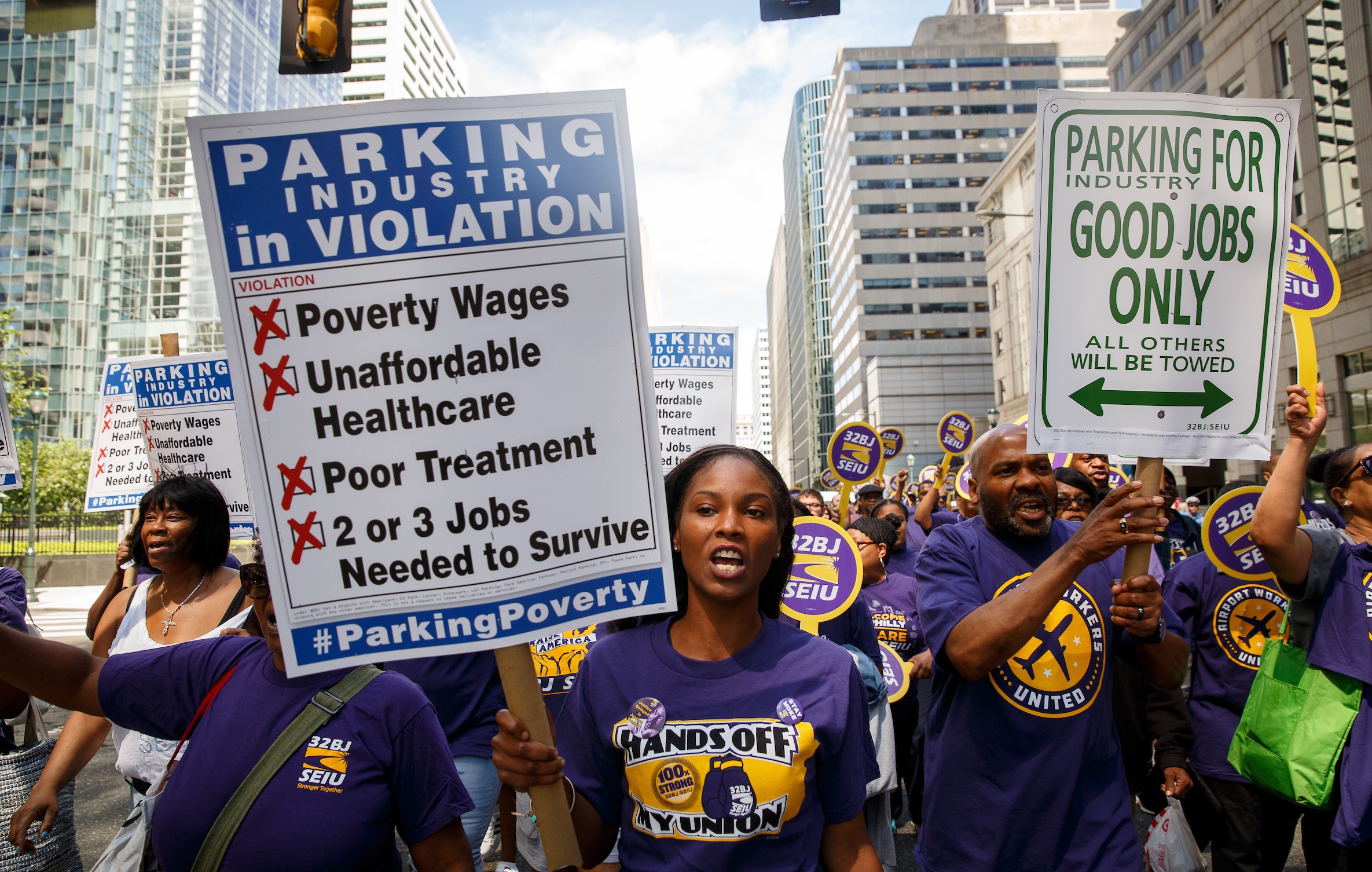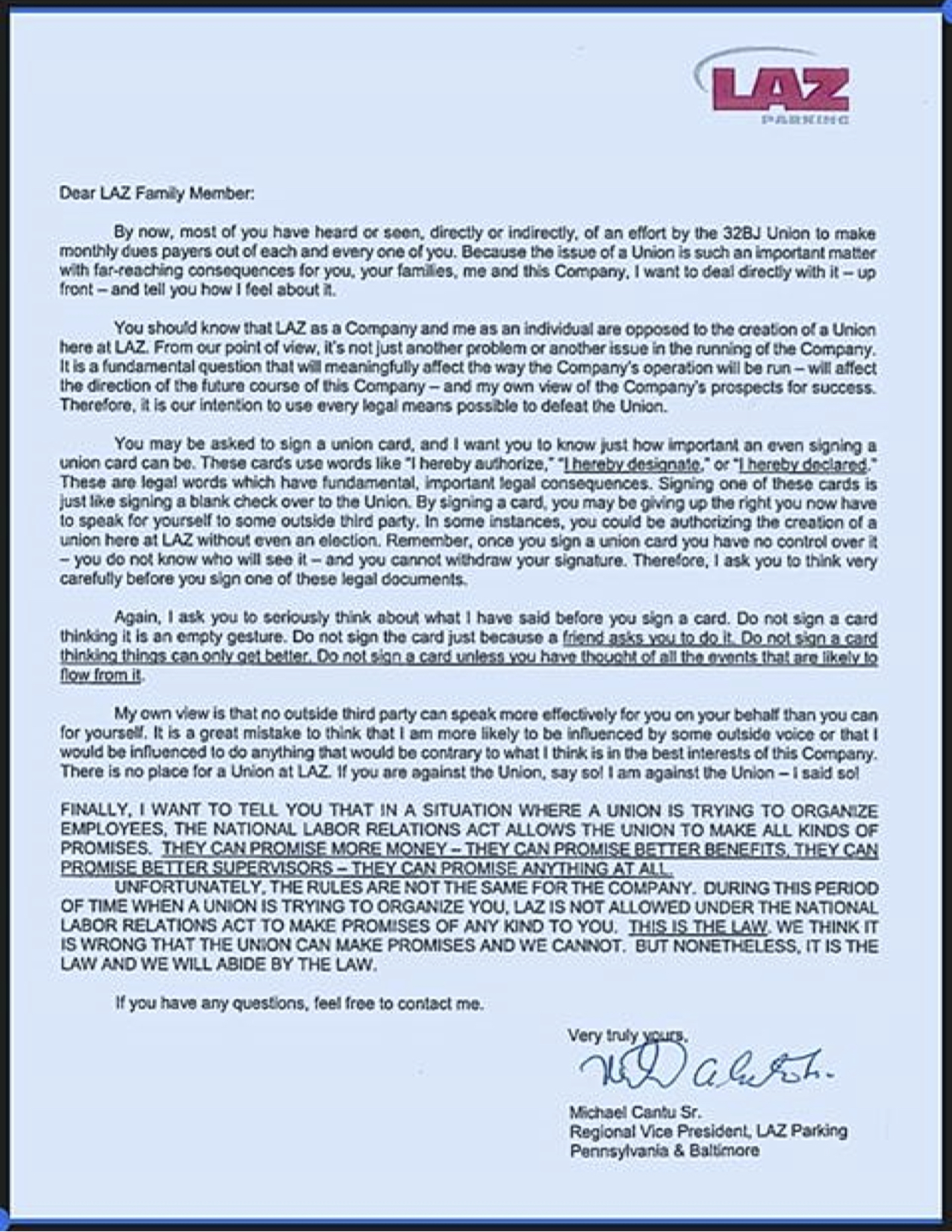
The chronicles of LAZ: the union, workers’ rights and the Philadelphia parking industry
On March 14, council member Cherelle Parker introduced a resolution authorizing the Council’s Committee of Labor and Civil Service to “hold a hearing examining low wages for parking workers in Philadelphia.”
On June 5, Mayor Jim Kenney signed Bill No. 190315, which established employment protections for parking workers.
Two weeks later, 400 parking workers took to the streets of Philadelphia to protest for better working conditions and higher wages for LAZ Parking workers, Alia Smith was one of them.
Smith worked full-time at Kimpton Hotel Palomar’s parking garage before she was fired. Now, she has filed charges against LAZ for unfair labor practices.
“People that I work with are afraid to speak up, in fear of losing their jobs. A lot of these CEOs, managers, and staff threaten people’s jobs, and like they don't have any other options,” said Smith.
Like Daniel Turner, Smith also worked full-time at LAZ. She was paid minimum wage, and her working conditions were “very poor.” She confronted management about her experiences but there was little they could do.
“They kind of just brush it off like ‘this is how things have been,’” said Smith.
Soon, LAZ workers grew tired of the situation and made their voices heard to a union called 32BJ. It is one of the largest unions on the East Coast, with more than 12,000 members in Philadelphia and represents security officers, office cleaners, window washers, building engineers, food services and municipal authorities.
“The Union came to us to get together because we need a third party to come in and kind of bridge in the gap,'' said Smith.

In response to the 32BJ’s involvement, LAZ issued a letter to workers from Pennsylvania and Baltimore Regional Sr. Vice President Michael Cantu, expressing the company’s opposition and intention to stop the union organization.
This conflicts with what the company calls “The Laz Way", or “people over profits,” as Jeff Karp, president and founder of LAZ, said in a promotional video.
The company accuses the union of being allowed to make “all kinds of promises - more money, better supervisors, anything at all,” under The National Labor Relations ACT, while LAZ can’t.
PA lawyer James F. Runckel, explained that things don’t really work that way. According to him, responsible Unions offer a voice at the workplace, protection against discrimination, unfair discharge and discipline, equal treatment and to improve economic situations.
But even if the Union were to do that, LAZ can’t because of the power dynamic, Runckel explains.
“The employer is in a position of power, controlling the workers’ jobs, controlling the workers’ hours, controlling the workers’ wages. The union is just trying to organize, does not have any coordinating power there. They can't coerce anybody to do anything.”
According to The National Labor Relations Act, it is illegal to threaten or coerce employees to interfere with the formation of any labor organization.
This very line left workers confused on whether or not they were threatened or warned. James F. Runckel thinks a lawyer probably wrote the letter for Cantu, and that is why the statement “toes on the edge of a threat and a warning.”
CONTENIDO RELACIONADO
Runckel explains that this kind of letter can be used as proof of unfair labor practices. For that reason, companies will hire lawyers who can get the message across without being too explicit.
“What they [companies in general] usually do is send their supervisors to one-on-one interrogate, coerce, and threaten-bargain union members,” said Rucknel.
After that, it’s a question of one side’s credibility compared to the other.

32BJ has been actively working on unionizing parking lot workers. In the case of LAZ valets, the Union published an open letter to Alan Lazowski, CEO and Founder of LAZ Parking.
“We are hearing the cries for help from these workers in our churches, organizations, council chambers and communities. We need you to hear them too,” reads the letter.
The statement was supported by 13 Connecticut State representatives - the state where LAZ was founded - almost 20 social activism organizations from across Pennsylvania, 4 PA State Representatives, 9 Philadelphia Council Members - including Helen Gym, Maria Quiñones-Sánchez and Cherelle Parker -and Philadelphia Mayor Jim Kenney.
In response to a request for comment from AL DÍA, the Mayor’s Office of Philadelphia said in an email that the intent in signing the letter was to show support for the workers and demonstrate to the company that this is “an issue the City takes seriously”.
LAZ did not address the letter.
However, the Compliance Unit in the Mayor’s Office of Labor is prepared to enforce Bill No. 190315 as soon as it takes effect on September 3, 2019.
On that day, Philadelphia will have the power to impose penalties and fines for violations, provide appropriate relief including reinstatement, restoration of hours, back pay, benefits for any infraction.
Despite the looming legislation, LAZ said it will not be “influenced by some outside voice.”
 This article is part of Broke in Philly, a collaborative reporting project among more than 20 news organizations, focused on economic mobility in Philadelphia. Read all of our reporting at brokeinphilly.org.
This article is part of Broke in Philly, a collaborative reporting project among more than 20 news organizations, focused on economic mobility in Philadelphia. Read all of our reporting at brokeinphilly.org.









DEJE UN COMENTARIO: